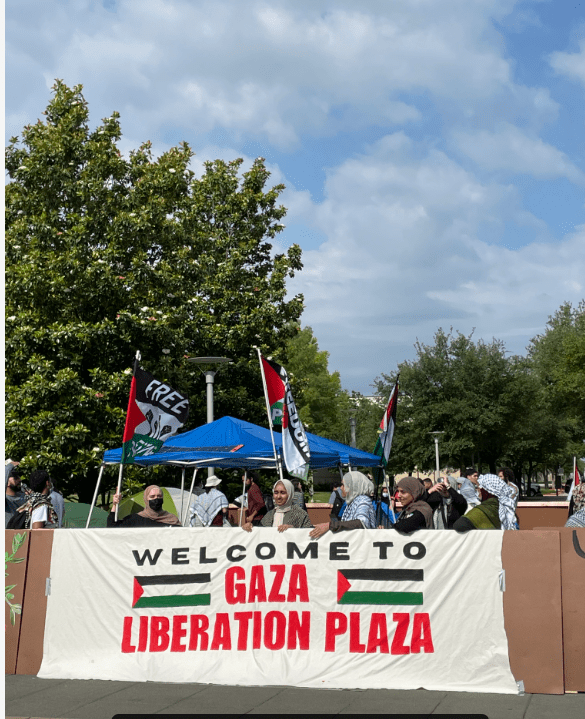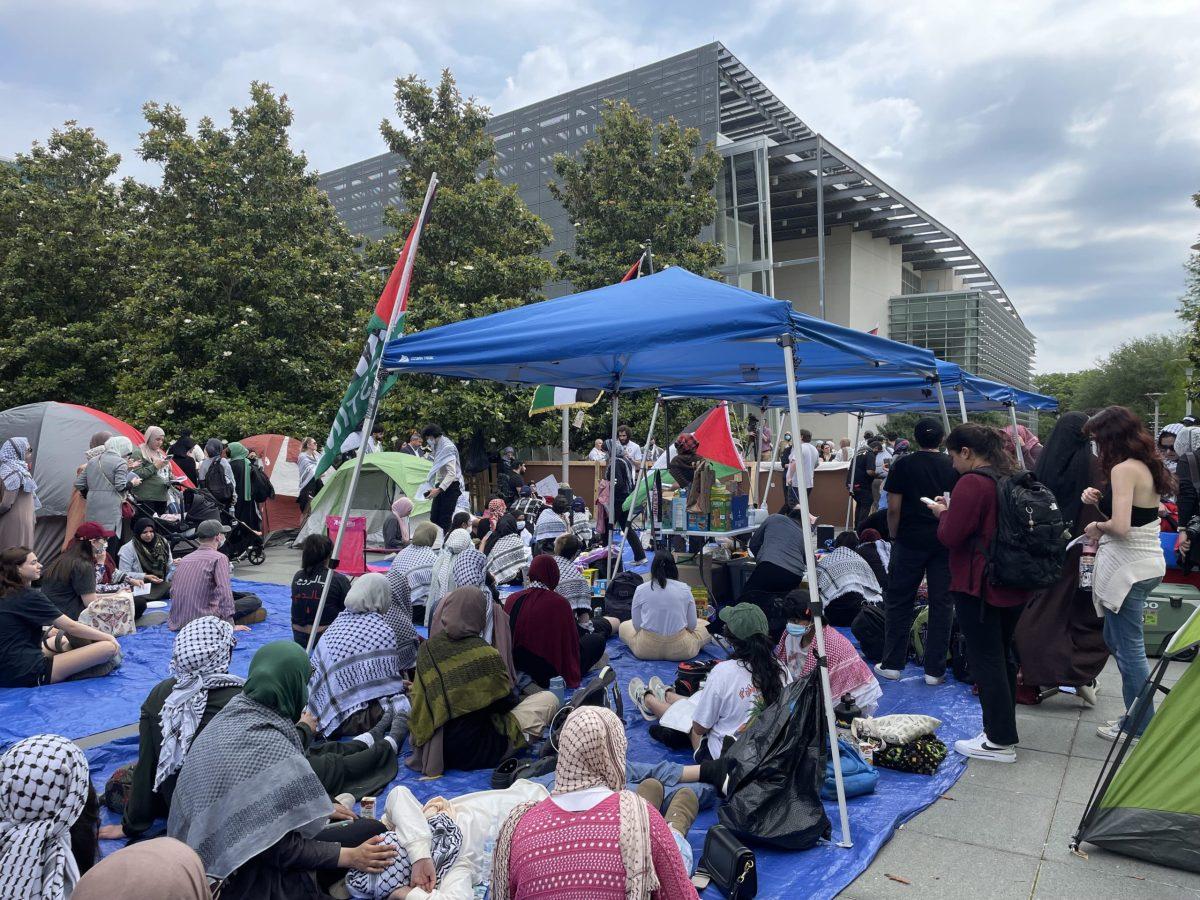Students established a solidarity encampment with Gaza at the Chess Plaza, surrounded by walls made of cardboard, plywood and tires with a sign reading “Free Palestine: all the walls will fall.” State and local police forces arrived 4 p.m., tearing down the encampment and arresting at least 16 students and three professors less than 12 hours after the encampment’s creation.
At 4:30 a.m. May 1, UTD students created the “Gaza Liberation Plaza” encampment, joining at least 13 other universities nationwide with similar demonstrations as the first encampment in north Texas. According to an Instagram post by UTD’s Students for Justice in Palestine, the encampment’s goal was to “escalate and put pressure on our university until UTD/UTIMCO divest from war profiteers and Palestine is free.” The encampment comes in the wake of last week’s protests on campus, which consisted of a walkout and sit-in beginning April 23 and culminating in the rejection of a meeting with UTD President Richard Benson April 26.
At 7:00 a.m., a post from SJP provided community guidelines for the event, which instructed attendees to not engage with counter-protesters. The guidelines also prohibited littering and vandalism, drug use, sharing personal information and “any forms of hate or bigotry.”
At 11:40 a.m., around 100 protesters were inside the encampment, which spanned the width of the Chess Plaza and blocked pedestrian access through the area. While the encampment was open to all, SJP representatives told members of The Mercury that reporters were not allowed inside the space and provided a blue tent nearby for the media.
SJP issued three demands: first, that UTD divest from Raytheon, Lockheed Martin, General Dynamics, Northrop Gruman and Boeing — military contractors that supply arms to Israel. Second, that UTD officially reject GA-44, an executive order passed by Gov. Greg Abbott which singles out groups like SJP as deserving punishment, which the Foundation for Individual Rights and Expression described as an act of censorship. Third, that UTD release an official statement calling for an “immediate, permanent cease-fire” in Gaza.
Imam Omar Suleiman — a prominent pro-Palestine activist and religious leader — appeared at the encampment to lead Fajr at 5:25 a.m., the first prayer of the day for Muslims. Suleiman guided the protesters through a song, which when translated into English means, “We will stay here until the pain goes away; we will live here, and the rhythm will change.” As part of his speech to those gathered for Fajr, Suleiman said that ease comes after suffering, and that now is a time of darkness as activists and the people of Palestine push for their liberation despite how “scary” it may be.
“Knowing that they know that we are with them in solidarity would be enough,” Suleiman said. “If we achieve nothing else beyond giving them a shoulder to cry on or a shoulder to stand on or amplify their voices, then that in and of itself is sufficient.”
At 11 a.m., history professor Ben Wright led protesters in a “read-in,” where the group silently read three articles and discussed them, after which another student read a poem. The readings focused on the military-industrial complex’s interaction with academia, the anniversary of the end of apartheid in South Africa and the destruction of archives and museums in Gaza. During the read-in, Wright discussed Palestinian poet and professor Refaat Alareer, who was killed by an Israeli airstrike Dec. 6 and whose poems have been cited extensively by U.S. activists; the small community library Wright set up at the encampment was named after Alareer. Wright said that when political movements occur on campus, faculty have the responsibility to protect students as well as provide “academic context” to current events.
“I was impressed to see so many students silently poring over the readings, carefully discussing these complicated issues, and learning from one another,” Wright said in a statement to The Mercury. “I hope the administration continues to avoid the catastrophic errors made by university administrators elsewhere and protect our students from police violence.”
The University of North Texas is the latest college campus to have major pro-Palestine protests with a few hundred students staging a walkout on April 30, according to NBC 5 Dallas-Fort Worth. “Israel backers” violently attacked UCLA’s encampment May 1, making it the first encampment to experience violence unrelated to law enforcement. Police forcefully dismantled UT Austin’s encampment April 29, arresting at least 40 protesters; between April 29 and 30 over 100 UT Austin protesters were arrested at similar encampments and protests. UTD’s protest, attended by families and community members as well as students and faculty, remained peaceful until the arrival of law enforcement including TDPD, Texas DPS, Texas Marshals, Richardson PD and Collin County PD.
Chief of Police Brent Tourangeau did not respond to requests for comment on how the university will respond to the encampment.
The encampment spread out from Chess Plaza at 4 p.m., moving east as state troopers arrived to barricade the plaza from the west, blocking protesters from leaving the grounds of the original camp. As of 5 p.m., protesters observed two snipers on a nearby building’s rooftop and Richardson Fire Department pickup trucks transported the torn-down encampment’s remnants away from campus. By 6 p.m, 200 demonstrators remained protesting despite the encampment’s eradication.
Correspondents from CBS, Fox 4, The Dallas Morning News, NBC 5 and the ABC were present at the scene. NBC 5 sent a news helicopter to the encampment, according to the charted flight path on Flight Radar 24, which was seen overhead since at least 9:50 a.m.
At 8:14 a.m. the International Students and Scholars Office sent an email to international students describing the potential consequences of protesting. The ISSO said that participation in demonstrations which leads to arrest or otherwise interferes with a student’s ability to meet their visa requirements could “impact [their] immigration status and ability to enter and remain in the U.S.”
At 11:15 a.m. SJP shared a private Slack message from Sheila Elliott, director of UTD Emergency Medical Services, in which she said UEMR volunteers “are prohibited from participating in any protest on campus.” In a statement to The Mercury, Elliott said all the volunteer EMS providers in UEMR “are required to uphold the Texas Administrative Code, or they can receive disciplinary action and/or lose their medical license.” Elliott said the prohibition on participating in campus protests applied to on-duty UEMR volunteers. Elliott said UEMR volunteers were instructed to increase EMR coverage on May 1 in case an escalation at the protest caused a large-scale medical emergency.
























